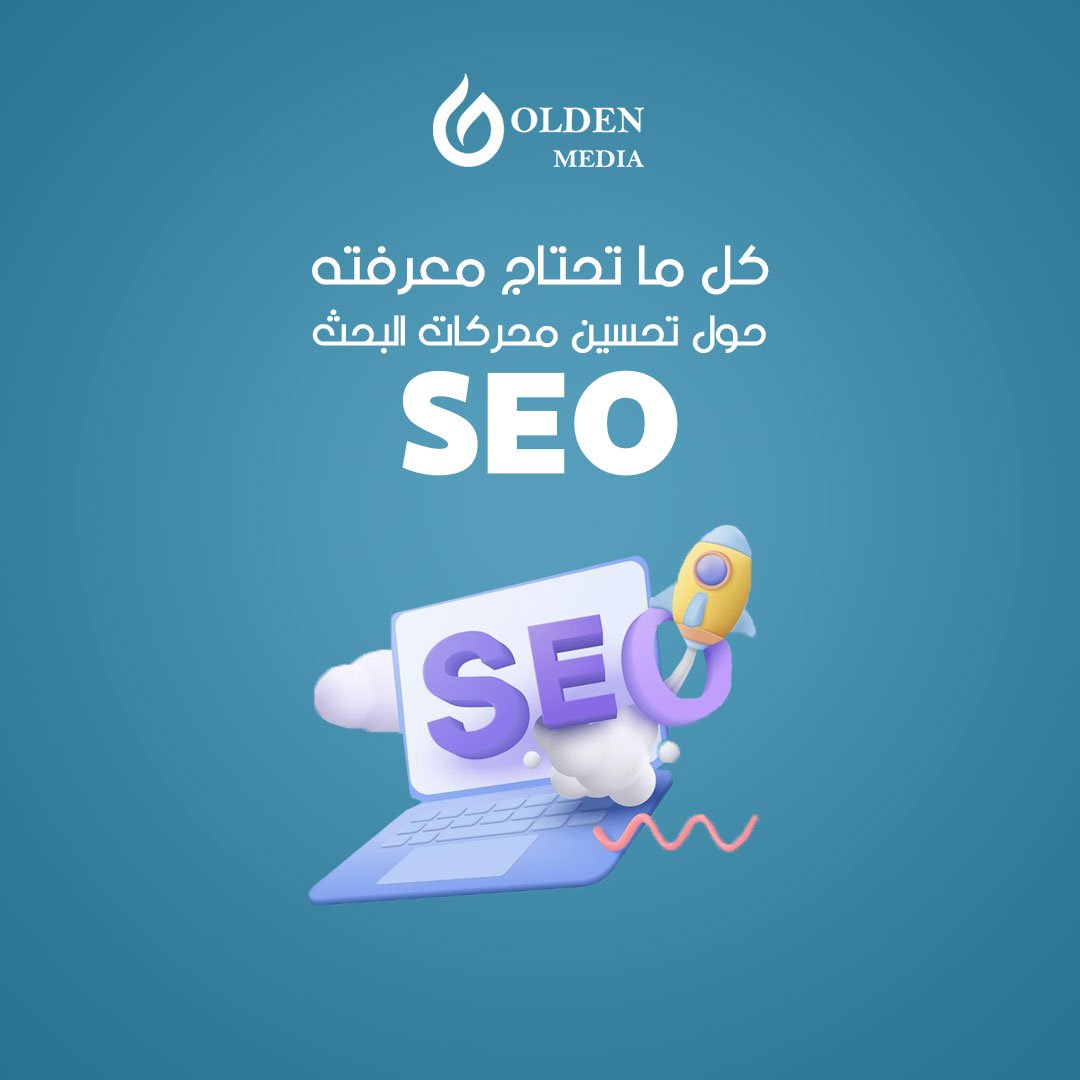Search Engine Optimization (SEO), or simply "SEO," is a process of optimizing your website to increase its visibility on search engines like Google, Microsoft Bing, and others. It is considered one of the most important fields in the marketing world today, as it offers numerous benefits to website owners, businesses, and service providers, making it one of the most sought-after areas globally.
In this article, we will explain everything you need to know about SEO, answering all your questions about its sections, benefits, domains, implementation, and why Golden Media is the best SEO company you can fully rely on to rank your website in search engines and gain a substantial amount of organic traffic without the need for paid advertising.
What you will learn after reading this guide:
1. What is SEO?
2. Why do I need SEO?
3. Types and domains of Search Engine Optimization.
4. Elements of Search Engine Optimization.
5. Key SEO tools.
6. Steps for optimizing Search Engine Optimization.
7. Factors for ranking on search engines.
8. Tips and strategies for Search Engine Optimization.
9. The best SEO company.
What is Search Engine Optimization (SEO)?
Search Engine Optimization (SEO) is a set of techniques and steps aimed at increasing the visibility of your website in search engine results such as Google, Bing, Yahoo, and others. SEO allows you to improve your website's ranking in search engine results, leading to a substantial increase in organic traffic without the need for paid advertising. This, in turn, can benefit your website or online store by accelerating its growth.
SEO encompasses various techniques, including keyword research, on-page SEO, off-page SEO, link building, and technical SEO. These techniques are used to make the website more appealing to both search engines and users.
Would you like to check if your website is SEO-friendly or not? Get a free consultation with us now!
How does SEO work?
To understand how SEO works more precisely, we need to examine the Search Engine Results Page (SERP), which ranks websites based on a constantly updated algorithm. Search engines apply this algorithm, which consists of various rules, to rank websites in the results.
Google's web crawlers continuously crawl the web to find new pages and add them to the Google index. When you search for any keyword on Google, you'll see a set of results on the SERP, and the websites are ranked based on numerous factors, which we will mention in this guide. Studies show that the website ranking first in the search engine results gets approximately 33% of the total search traffic.
The following table illustrates the distribution of search traffic among website rankings on a search engine:
As you can see, the top-ranked websites receive the highest number of users. Therefore, it is essential to invest in SEO services to achieve top rankings.
The Importance of Search Engine Optimization (SEO)
Search Engine Optimization (SEO) is considered a powerful and effective tool for attracting visitors to your website or online store without the need for paid advertising. SEO is a fundamental element for any business, whether large or small, if you want to grow and reach a large local or global audience.
Search Engine Optimization is a key factor in the success and rapid growth of companies. It serves as a valuable tool for brand awareness, building relationships with potential customers, and establishing yourself as a trustworthy expert in your field. For example, Neil Patel's company is one of the fastest-growing startups in the United States, thanks to SEO, which contributes to more than 50% of its customer acquisition.
Another example in Saudi Arabia is the e-commerce platform Noon, launched in 2017. Noon placed significant emphasis on SEO and employed experts to create high-quality content to improve its search engine rankings. This effort helped attract a massive customer base and achieve global success.
Still not convinced? Here are the benefits of SEO, regardless of the size of your business:
1. Attract more visitors to your website.
2. Increase brand awareness faster.
3. Boost customer acquisition and sales.
4. Build trust and relationships with customers.
5. Cost-effective SEO with a higher return on investment.
6. Continuous growth.
7. Outperform competitors.
In summary, Search Engine Optimization is the best investment you can make. By establishing a strong online presence, you can reap significant benefits and business success.
Types and Sections of Search Engine Optimization
Search Engine Optimization is divided into four main sections, without which you cannot achieve top rankings in search engine results. These sections are On-Page SEO, Off-Page SEO, Technical SEO, and Content. These four elements are essential in any SEO strategy.
If you intend to hire the best SEO company, you must understand the company's or service provider's strategy in implementing these four elements. We will explain each of them separately.
On-Page SEO
On-Page SEO refers to the practices and steps you implement within your website to improve its pages' rankings in search engines. On-Page SEO includes the following:
1. Keyword Research
Keywords, or key phrases, in the realm of search engine optimization, are words and phrases you incorporate into your content to help users find your website when they type these keywords into a search engine like Google. For example, if you want to find the website of "Golden Media," you will find our site in search results because this keyword is correctly included in our website's title and content without unnecessary keyword stuffing.
But how do you obtain these keywords? There are tools that can assist you in identifying keywords and their monthly search rates. Some of these popular tools include Google Planner, Keyword Tool, SEMrush, and Ahrefs. You select the country or region you want to target, choose the language, and enter the keyword. These tools will display the search rate, keyword difficulty (KD), and average cost per click (CPC). If you are confused about these terms, check out our article on all digital marketing terminology. You can also include more than one related or synonymous keyword to target.
2. Titles and Headings
In SEO, titles are divided into two sections: the main title (H1), which is displayed in search engine results, and subheadings (H2, H3, H4, H5), which are crafted within the article. It is important to maintain the sequence of these headings, add your keywords, and diversify them without repetition or stuffing.
3. Meta Tags
Meta tags are HTML tags typically found in the website's header. Their purpose is to describe the content of the page and only appear in the source code of the page. These meta tags help search engines like Google understand the content and topic of your page. Most website building tools, such as Shopify, Squarespace, WordPress, Blogger, and others, usually have these meta tags pre-configured.
4. High-Quality Content Writing
Writing SEO-compatible content differs in some aspects from content written for books, magazines, and other media. It involves subheadings, includes keywords, and provides high-quality content that aligns with the user's intent. Optimizing page headers facilitates easy crawling of the page.
5. Site Structure and Layout
The site structure should offer users a good experience, making it easy for visitors to interact with your website content, whether text or visual.
6. Template
The website template is the appearance in which your website is presented to visitors, displaying your content. Many templates are programmed for website owners and are SEO-compatible, containing the correct meta tags. These templates can be either free or paid, with features and tools that help improve user experience on your site.
7. Internal Links
Internal links are links embedded within your site to connect two pages within the same website. External links, on the other hand, are links placed on your site that lead to other websites.
8. Images and Multimedia
Optimizing on-page SEO on your website is one of the most important elements that you need to do, or you may need to hire an SEO expert.
Off-Page SEO
Off-Page SEO refers to activities and steps taken outside of your website with the aim of enhancing your website's authority and effectiveness, as defined by Moz's Domain Authority (DA). Domain Authority is evaluated by the number of high-quality external links your website possesses. If you're confused about these terms, here's a detailed explanation of each:
- **Domain Authority (DA)**: DA is a rating established by Moz, indicating a website's potential to rank in search engines by comparing it to Google's ranking factors for Search Engine Results Pages (SERP), as previously explained.
- **Page Authority (PA)**: PA is a technique developed by Moz that predicts how a specific page will rank on SERPs.
- **Spam Score (SS)**: SS is the percentage of practices and elements that Moz has identified as violations or subject to Google penalties, such as obtaining external links from sites that violate search engine policies.
Off-Page SEO encompasses the following:
1. **Backlinking**: Building external backlinks to your website.
2. **Social Media Sharing**: Sharing your website on social media platforms.
3. **Guest Posting**: Writing and publishing articles on other websites or blogs with a link back to your site.
4. **Social Bookmarking**: Bookmarking your website on social bookmarking platforms.
Off-Page SEO significantly contributes to strengthening your website and gaining the trust of search engines. It's important to have a clear strategy and a specialized team for building high-quality external links that are relevant to your site's content. For instance, the "Golden Media" website offers everything you need in the world of digital marketing, making it the best option for obtaining links from sites relevant to digital marketing.
Technical SEO
Technical SEO is the process of optimizing a website for search engines. However, it can also involve activities aimed at improving the user experience and facilitating the indexing of your site by search engines. Technical SEO includes the following activities:
- Submitting a sitemap to Google.
- Making your website searchable by search engines by creating a robots.txt file.
- Enhancing the user experience on both desktop and mobile devices.
- Programming the website.
- Site structure, links, and security certificate.
- Database management, cPanel, and other website building tools like WordPress, Wix, and more.
- Identifying and rectifying duplicate content issues.
Thanks to website building tools like WordPress and Wix, solving technical issues has become easier due to their user-friendly databases and the ability to install plugins that provide better control over your website.
**4. Content Writing (SEO)**
Content is always and forever the king, according to Google. Yes, we acknowledge that content is part of On-Page SEO, but due to its immense importance, we consider it as an independent element among the key SEO components. Content writing for SEO is a skill acquired through practice and experience. The process of content optimization involves creating high-quality, search engine-optimized content that provides real value to visitors and answers their questions.
SEO-friendly content encompasses several aspects, such as keyword research and proper keyword placement in headings and paragraphs. It involves creating content that is relevant to the target audience and valuable. It also entails optimizing content for search engines by writing attractive titles and descriptions that appear on search engine results pages (SERPs) and encourage the audience to choose your content. Additionally, it includes adding internal and external links and providing alt text and descriptions for images.
Contrary to common belief, SEO content writing is not limited to blog posts. It can take various forms, including:
**Pillar Pages (Comprehensive Web Pages):**
These are long-form pieces of content optimized for a broad, primary keyword. This keyword should be essential to your business or activity and is divided into different sub-sections within the main page. The purpose is to organize website content and improve its ranking in search results.
Key benefits include:
- Providing comprehensive information about a specific topic, such as defining your company or activity.
- Assisting search engines in understanding your website's content.
- Aiding in the creation of both internal and external links.
- Building authority and trust.
**Lead Generation-Focused Posts:**
These are website posts designed to attract visitors and convert them into potential customers. This type of content often includes calls to action (CTAs) that prompt visitors to interact with the content.
**Landing Pages:**
Landing pages are designed to attract visitors, convert them into potential customers, and increase sales. They are commonly used in e-commerce stores like Shopify and WooCommerce. Customers reach these pages after clicking on an online advertisement link and typically contain details about the advertised product or service.
Blog Posts:
These are regular, often personalized or professional, content pieces written on websites.
Articles:
Articles discuss specific topics and can be short or long, ranging up to 3000 words or more. They typically contain information, ideas, or stories and are often published on websites or blogs. This article serves as a prime example.
It's worth noting that not all types of content are acceptable for ranking in search engines. It's important to familiarize yourself with Google's content policies to avoid any violations.
**Important SEO Tools**
There are many tools that will greatly assist you in improving your search engine ranking and visibility. These tools can be either free or paid and offer website owners numerous benefits and features. Here are the most important ones:
**Google Search Console (GSC)**
Google Search Console is a free tool by Google designed to help website administrators manage and enhance their websites for better search engine results. This tool aids in complete website management, indexing your pages in search engines, providing performance reports, as well as understanding user experience and both internal and external links.
**Google Analytics**
Google Analytics is another free tool by Google that provides detailed reports on website traffic. It allows you to understand your visitors, their behavior, how they found your website, and what they do while on it. With Google Analytics, you can access information such as the number of visits, traffic sources, the most visited webpages, the time visitors spend on your site, and the pages where visitors exit your website, among other valuable insights.
**SEMrush**
SEMrush is a tool that assists with SEO, content marketing, and competitor analysis. It offers a wide range of features and benefits to help improve your website's search engine ranking, attract more visitors, and measure the success of your marketing campaigns. Some of its key functions include keyword research, website analysis, competitor analysis, and content analysis.
**Page Speed Insights**
This tool allows you to test your website's speed and identify technical issues that may affect its performance. Additionally, it provides recommendations for addressing these issues.
**Moz**
Moz is a technology company that offers a suite of SEO, web analytics, and content marketing tools. Among its products is Moz Pro, a comprehensive SEO tool that greatly assists in tracking both internal and external links to your site with precision.
Steps to Improve Search Engine Optimization
**Key Factors for Ranking on Google Search in SEO**
When thinking about ranking on Google search, there are several aspects that need to be taken care of. Is it the content? Is it the quality and speed of the website? Is it the backlinks? Well, to answer the most common question in the field of search engine optimization (SEO), which is, "What are the ranking factors in Google?" we will present a study by FirstPageSage on the factors that contribute to ranking on Google search.
Here is the distribution of the percentage of ranking factors on Google search according to the study:
- Continuous Publishing of High-Quality Content: 26%
- Presence of Keywords in the Main Title: 17%
- Backlinks: 15%
- Expertise in the Field Covered by the Website: 13%
- User Engagement with the Website's Content: 11%
- Internal Links: 5%
- Mobile-Friendly/ Mobile-First: 5%
- Website Speed: 2%
- SSL Certificate (Security Certificate): 2%
- Site Data Organization and Schema Markup: 1%
- Keywords in the URL: 1%
- Keywords in the H1 Title: 1%
Certainly, it cannot be claimed that these factors are 100% accurate, as there are many other factors that can contribute to ranking, such as a strong presence on social media platforms, domain age, and site structure. Another reason is Google's continuous updates to its search engine algorithms and ranking factors, such as the May 2022 update.
Why is Google Search Engine the Best?
Google Search Engine is one among many search engines like Yahoo, Bing, Baidu, Yandex, and many others. However, Google is the most famous and widely used search engine in the world, commanding a 92% market share.
This is due to several reasons. Google is known for its precision and has complex algorithms that understand exactly what users need. Additionally, Google offers speed, support for multiple languages, an enhanced user experience, and a variety of services like translation, among many other features that are too numerous to list.
We emphasize the importance of Google Search Engine as the best choice for improving SEO and gaining organic traffic through ranking, as it handles 8.5 billion searches daily.
**Top Tips and Strategies for Search Engine Optimization (SEO)**
We will provide you with some tips from our team of experts in the field of search engine optimization (SEO). These tips will help you build effective SEO strategies and make your work easier:
1. **Understand User Intent and Behavior:** When researching keywords, for example, make sure you fully understand the purpose of searches for these keywords. Knowing the intent and behavior of searchers will help you create valuable content that answers their questions or fulfills their needs, ultimately leading to better results in search engines.
2. **Focus on Quality:** Many people who write for websites focus on writing for search engines rather than users. Always prioritize creating high-quality content that provides real value to users because users are the key to success in search engines.
3. **Tracking and Reporting:** As mentioned earlier, free tools like Google Search Console (GSC) and Google Analytics are highly effective tools for tracking the status of your content. They help you identify which pages have the highest view rates, visitor retention rates, and provide you with a wealth of information to continue improving your site's content.
4. **Be Patient and Don't Rush:** SEO is not a switch that you can flip, and visitors will start flooding your site. SEO takes months to begin seeing results, but when you work diligently and results start to appear, you will notice rapid and effective growth in what you have achieved.
5. **Don't Neglect Image and Media Optimization:** Multimedia is extremely important and not less important than content. Optimizing multimedia gives you a greater chance of ranking.
6. **Stay Informed About What's New:** The technical fields update very quickly compared to other fields. Without a doubt, many changes have occurred in SEO in recent years, such as the launch of artificial intelligence, making you a successful SEO expert who knows the latest developments and employs new strategies and tools to your advantage.
**Why Choose Golden Media as the Best SEO Company?**
If you're looking for a specialized company with full experience in search engine optimization, Golden Media is your first choice to achieve your goals. We are a specialized comprehensive and advanced SEO company with 10 years of experience in helping various clients reach a larger audience from search results and improve their ranking on Google.
We assist you with innovative methods and strategies to compete and get visitors to your business through our integrated services.
- Internal SEO Optimization.
- External SEO Optimization.
- Web Development and Mobile Application Programming.
- High-Quality Content Writing for Ranking.
**What Makes Us the Best?**
- We use the latest technologies and keep up with the latest developments in the field of SEO.
- We have a results-oriented team with extensive experience and many previous experiences with many clients in developing their businesses and achieving their marketing goals in various fields, including search engine optimization, content writing, paid advertising, social media page management, and much more.
**Extensive Experience**
**Outstanding Team**
**Development and Innovation**
**We Use the Best Tools**
**Custom Strategies**
**Full Transparency**
**Are You Still Unsure?**
Get a free consultation now!
Join us and get assistance from the team of experts at Golden Media to improve your website's ranking on the web in search results.
Start Now!




.jpg)